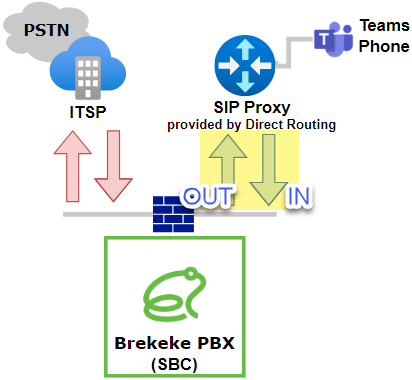2. Create Routes From/To the SIP Proxy Server of Direct Routing
Brekeke PBX < – > SIP Proxy Server (Teams)
1. Download the sample ARS route template file from here >> sample_teams file
2. Log in your Brekeke PBX and import the downloaded file at the [PBX] >[ARS] page.
3. Click the imported “sample_teams” route template in the list to move to [Variable Setting] page.
4. On the [Variable Setting] page, click the “New Route” button to add the new routes with this route template to allow inbound outbound calls between the teams SIP Proxy Server.
5. Enter the correct values for each variable to define the route. Then click save button.
[Route Local Variables]
| Field Name | Description |
| Route Name | Enter any route name . |
| Tenant | *Brekeke PBX Multi-Tenant edition only.
Enter tenant name in Brekeke PBX that will use this route. |
| Domain | Your Brekeke PBX’s (SBC) domain name *1 |
| Country Code | Enter Country code without “+” |
| Interface IP | This setting is optional. It may be necessary when the server running the Brekeke product communicates with the outside world using multiple IP addresses. In most cases, this setting is not used, so leave it blank. |
| RTP bind IP | This setting is optional. It may be necessary when the server running the Brekeke product communicates with the outside world using multiple IP addresses. In most cases, this setting is not used, so leave it blank. |
*1. The domain name must be from one of the names registered in ‘Domains’ of the Enterprise Microsoft 365 tenant.
Reference >> 1. Register SBC Domain in Microsoft 365
Example:
| Field Name | Example |
| Route Name |
brekeke.demo |
| Tenant |
tenant1 *Brekeke PBX Multi-Tenant edition only. *Please replace this with your appropriate tenant’s name. |
| Domain |
test6.brekeke.com |
| Country Code |
1 |
| Interface IP | <blank> |
| RTP bind IP | <blank> |
6. Move to the [PBX] > [Options] > [Advanced] menu. Then add the following advanced properties for Direct Routing.
mediaex.rfc2833.mark.passthru=true teams.ice=false teams.dtls=false
7. Move to the [SIP SERVER] > [Configuration] > [Advanced] menu. Then add the following advanced properties for Direct Routing.
interop.teams.replace.req-uri=true
After Saved, You need to restart PBX to enable the settings.

